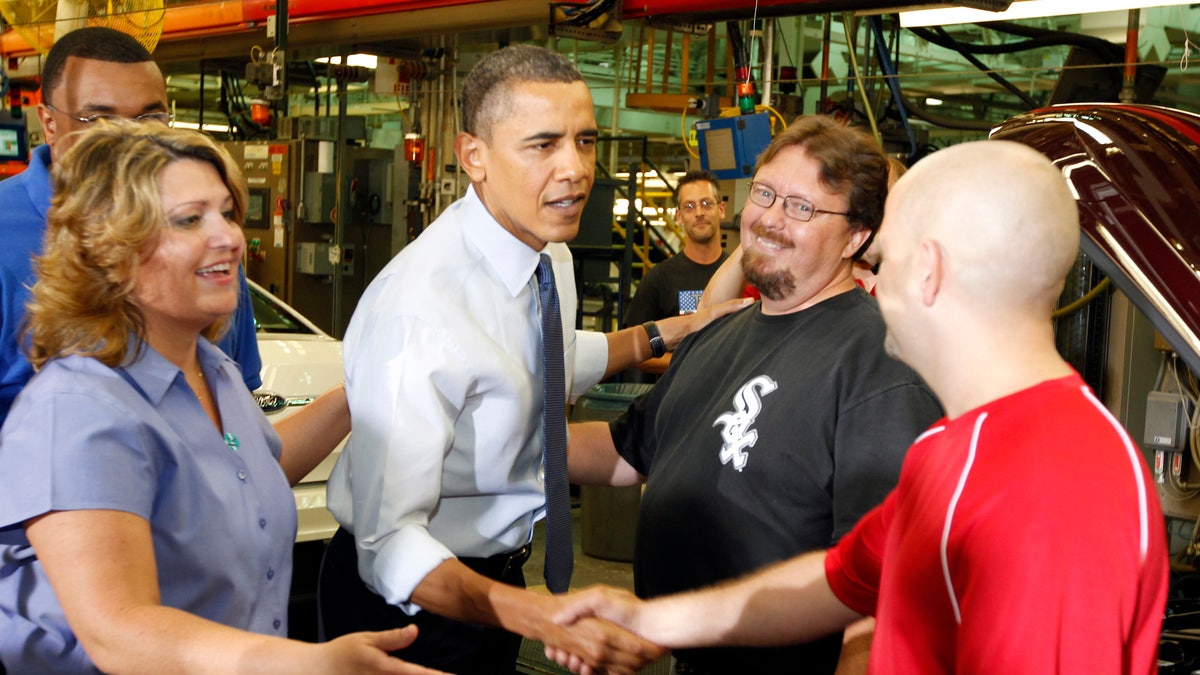
CHICAGO - AUGUST 5: U.S. President Barack Obama (3rd L) greets an assembly line workers while touring the Ford Motor Company Chicago Assembly Plant August 5, 2010 in Chicago, Illinois. According to reports, Ford said the plant will add 1.200 new jobs made possible by a Dept. of Energy loan that is intended to help companies retool to make fuel-efficient vehicles. (Photo by Jeff Haynes/Getty Images) (2010 Getty Images)
During his State of the Union address, the president proposed raising the federal minimum wage from $7.25 to $9 an hour.
Like so many of his economic proposals – stimulus spending, healthcare for all, tax the rich – a minimum wage increase is great politics for Obama, but terrible policy for Americans.
The unintended consequence of employment reductions is very real, and felt most by those with the least amount of education and experience.
It’s simple math: a higher minimum wage means a higher hiring cost for businesses, and a higher hiring cost means fewer jobs. The unintended consequence of employment reductions is very real, and felt most by those with the least amount of education and experience.
This means that the most vulnerable Americans are those hardest hit: young, lower-income minority workers on their first job.
Inexplicably, the Obama White House has claimed that "a range of economic studies show that modestly raising the minimum wage increases earnings and reduces poverty without measurably reducing employment."
But University of California at Irvine economist David Neumark has looked at more than 100 major academic studies on the minimum wage, and concluded that 85 percent of the studies "find a negative employment effect on low-skilled workers."
Indeed, economic studies dating back to the 1940s have warned that raising the minimum wage will cause job losses for the least experienced workers, a finding that has only been strengthened by our recent experience:
On May 24, 2007, Congress passed legislation to increase the federal minimum wage by nearly 42 percent, from $5.15 to $7.25. Then-House Speaker Nancy Pelosi captured the general mood in Washington when she exclaimed, “millions of hardworking Americans will be getting a raise.”
The public was also supportive, with polls showing broad approval of Congress’ efforts to raise the minimum wage. And why not? Who doesn’t like the sound of higher wages?
But three years after the passage of federal wage legislation, teen employment is suffering tremendously.
Since the minimum wage increase, employment for teens has fallen by 6.9 percent —even taking into account the effects of the recession. Over 114,000 fewer teens are employed today as a result of the federal wage increase.
The unemployment rate for 16- to 19-year-olds remains above 25 percent; for those ages 16 to 17, the unemployment rate is close to 30 percent.
For minority teens, it’s nearly 40 percent.
For these young, lower-income minorities, a first job represents the first rung on the ladder to being a self-sufficient and contributing member of society.
Raising the minimum wage is bad for jobs and the economy generally, but for minority youths, it’s an immoral disaster.
There is an alternative: a training wage or youth exemption that would allow young workers to opt-out of the new minimum wage in order to keep their jobs.
But for now, Obama has proposed nothing of the sort. Ironically, the minority youths that will be hurt the most by Obama’s latest economic folly are among his most loyal supporters.
Obama easily won the youth vote nationally, 67 percent to Romney’s 30 percent, with young voters proving the decisive difference in Florida, Virginia, Pennsylvania and Ohio.
Now, Obama’s left them out in the cold.








































